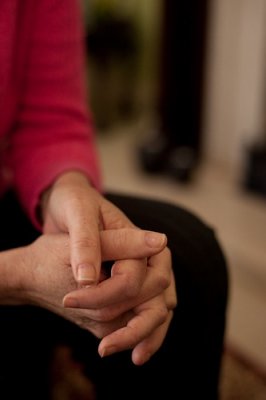Overcoming OCD: a Case Study of “Pure O”

photo by Niklas Hamann
Is overcoming OCD even possible? When all your compulsions play out in your head?
Writer Jenni Brooks shares her personal journey of primarily obsessional OCD.
How it all began
“When I was seven, I got scarlet fever. I was put on antibiotics and had two weeks off school. After that period was up, I seemed fine. Physically, at least.
After my first day back at school I watched the Guinness World Records on TV. There was a section in which a woman swallowed a sword and then pulled it up again without damaging her organs.
After the episode finished, I wondered what would happen if I went into the kitchen, picked up a knife, and swallowed it.
I remember thinking that thought was strange. I knew I didn’t want to ram a knife down my throat. But the more I thought about it the harder it was to stop thinking about it.
After that, I started getting many other disturbing thoughts. What if I stabbed my sister to death while she was sleeping? What if I gorged my own eyes out? Or if I shaved my head?
And then came my breaking point
I finally reached breaking point while on a family holiday to Greece a few months later. In a public bathroom I saw a bottle of bleach and wondered what would happen if I drank it.
This triggered a three hour meltdown. And afterwards I couldn’t even relax in our hotel room, because I knew there was a bottle of bleach next to the toilet.
Struggling to get therapy

By: Ashlee Martin
After coming back from Greece, my parents took me to see my GP.
I was referred to my local children’s hospital, because my GP thought I may have a rare condition called PANDAS Syndrome. This is where a strep infection triggers an autoimmune response that attacks part of the brain. It can cause a range of rapid onset neuropsychiatric conditions, including obsessive compulsive disorder (OCD).
After one appointment at the hospital, the psychologist decided not to proceed with any treatment. My symptoms were too puzzling. I wasn’t displaying typical OCD symptoms, like excessive hand-washing. Instead, my main symptoms were excruciating intrusive thoughts with no overt compulsions.
I guess there just wasn’t as much talk then, even with mental health practitioners, about ‘pure O‘, primarily obsessional OCD. Where your compulsions take place in your mind. Which is why I’m writing this case study about overcoming OCD. So fewer kids like me get overlooked.
My OCD symptoms just got worse
After being discharged from hospital my symptoms didn’t get better, they got worse. And I also had the added guilt of believing that I made up my symptoms.
No one told me why I got discharged. I was left to assume that I had put it on for attention. After that I no longer felt able to tell anyone what I was going through.
I kept this up for six years. But when I was 13, I started having intrusive thoughts about sex.
I couldn’t make eye contact with my reflection in the mirror because I was so disgusted by my myself and my thoughts.
I couldn’t take it anymore. Finally I told my mum that I was still getting distressing thoughts. She then took me back to the doctor who referred me to mental health services.
A doctor who finally listens

photo by Humberto Chavez
The doctor was very patient. She asked my mum to leave the room so I could talk to her on my own. She told me that I wouldn’t tell her anything that would shock her, because she’d heard it all before.
This appointment in particular helped me a great deal, because it was the first time I ever really felt listened to.
The wait for an NHS therapist
Trying therapy with the NHS
In the end I had a six-month course of cognitive behavioural therapy (CBT) on the NHS. I liked the therapist, but this sort of therapy focuses on looking at your unbalanced thoughts.

By: Joe Houghton
Because I was so ashamed of my thoughts, I didn’t feel comfortable enough to discuss them in much detail.
I tried another three months of CBT when I was seventeen, but it still wasn’t working for me.
Then when I was 19, I also had a course of exposure therapy for 6 weeks. Exposure therapy aims to expose sufferers to triggers, so that they feel more comfortable being around them. For instance, if a sufferer is fearful of germs, they may be made to not wash their hands after blowing their nose, just so that they can see that they wouldn’t catch a serious disease.
I didn’t have any overt triggers that exacerbated my symptoms because my OCD was purely focused on intrusive thoughts. So I didn’t find this type of therapy very helpful. I think you’d need to work with an exposure therapist who was a specialist is purely obsessional OCD to have results.
What therapy works for overcoming OCD?
In the end I decided to save up so I could get private therapy instead. Then I could see someone straight away, instead of going back to my GP to be put on yet another waiting list. I could also pick and choose which therapy was right for me.
In the past few months I have been seeing an integrative therapist. And I finally have a feeling I am moving forward. My therapist combines elements of different therapies, such as cognitive behavioural therapy (CBT) and dialectical behaviour therapy (DBT), and mixes them together to make it more individualised for each client.
What is different this time is that my sessions are less focused on my symptoms themselves, and more focused on how they came about in the first place. Instead of addressing my thoughts head on, we are instead going through the reasons as to why I’m having the thoughts.
At first, I was quite guarded with this new therapist, but this was probably because I had been disappointed so much in the past and I was doubtful that this type of therapy would work and see me overcoming OCD. But now I’m feeling hopeful.
Me, beneath the OCD
I have noticed that a lot of my thoughts seem to be orientated as to whether what I’m experiencing is true or false. Am I making up my symptoms? Am I actually good at my job? Did I accidentally kill someone 3 years ago?
Now I know that the pattern of these thoughts stem from when I was little, and I was convinced I had made my symptoms up. This is why they have taken on that theme. I still subconsciously don’t know if my symptoms are real or fake.
Although my intrusive thoughts may never go away completely, knowing why these patterns re-occur has made my life a lot easier. I can rationalise my thoughts in a way I couldn’t before because I know why they are happening. I no longer feel defined by them.
You are not alone
If you have OCD, remember that your thoughts don’t define you, and having distressing thoughts doesn’t mean that you’re going to act on them.
Even though the thoughts you are having are horrifying and alienating, there are countless others who are going through the same struggle as you are. Just keep going.
Overcoming OCD is quite the battle. But whether I want them to or not, my intrusive thoughts have made me into who I am today, even though I am no longer defined by them.
Do you worry you might have OCD? Harley Therapy connects you with top London psychotherapists who offer therapy for OCD. from the comfort of our central London clinics. Alternatively, use our booking site to find UK-wide therapists for OCD as well as online counsellors you can talk with from home, therapists for all budgets.
Jenni Brooks is a freelance blogger and journalist currently studying an MA Creative Writing at the University of Birmingham.






Hello, I enjoyed your story. It runs somewhat parallel to mine. Had major onset senior year of high school, had compulsions I had to get over first, hours in the bathroom, ruined vacations etc. went to Mclean hospital in Boston which I was told is the foremost ocd treatment center in America, maybe the world – not sure about that bit but it sounds good to me. Had an incredible time with other people with different kinds of terrible ocd, met some very informed and interesting therapists. Tried exposure response, didn’t work. Went back to Kansas, haven’t had a therapist since then. This was years ago at this point. When I got back I had a renewed energy to overcome my ocd and the ocd also kind of morphed into mental ocd and pure O after I got over the compulsions of which I had many – which cycled through a numerous amount of increasingly nuanced mental issues (themes) each digging into my mind deeper than the last and seeming more complex. My life has been consumed by ocd. I have been dealing with ocd digging in and weaving a complex tapestry of symptoms for long enough to become familiar with how it works and develop the skills myself to rationalize and overcome my ocd to a certain extent. My ocd has latched onto themes which seem impossible to shake but faith in myself never falters. Since ocd has taken over my life I have taken learning how to overcome it very seriously. I have been learning the steps purely through observing my own first hand experiences, finding the mental tools and awareness I need to move forward – and also with the major benefit of a great, smart, supportive family and friends. I like the idea of defeating it without a guide, so I’ve become my own guide and it has made me a greater and stronger person, for that I thank my OCD, though I’m not a master yet and still have many hurdles and changes in perspective to overcome. I’m 27 now and have been struggling hard living with ocd for a good 8 years. Recently I have been struggling with ocd with tv and videogames and social anxiety/issues. I’ve probably had ocd with tv and picture settings the whole time but right now I can’t be comfortable with the angle of the tv because it washes out the colors, I really like to get immersed and look at the scenery in games so this is a big problem. I can’t really sit down and enjoy a game anymore, I spend hours getting up and moving the tv or angle milimeters or centimeters and sit down get up and sit down over and over till the anxiety is too much to enjoy the game at all anymore, I don’t have an outlet to relax because my mind is constantly revving with overthinking and not being able to project myself in front of people because being funny requires good delivery and if you’re ridiculously awkward when it comes out like my ocd wants me to be then it doesn’t work. I can’t go to my parents to have a relaxed safe place and see the dogs because coronavirus and my dad is taking coronavirus really seriously because of heart issues. So I’m here trying to lift myself out of my depression and figure out the natural way to train myself and get over the social shit, tv I just have to sit with it but it’s really hard because I’m not enjoying the game while I’m playing, the hypersensitivity gives me a headache, I feel like whatever game I force myself to sit through will be a wasted experience because I can’t enjoy it, there are many factors – all the while my personality is being drained because my ocd (myself) will not allow me to have confidence, it will make me awkward through hypersensivity to muscular movements and intrusive thoughts and whatever it can pull out of me to make me awkward in front of people and not be able to be myself and be funny. Comedy is the greatest thing in life, one of the things I believe. OCD strips me of my ability to involve myself with it to a certain extent, and develop my personality with people. There are variables that change how I feel and how easy it is to deal with day to day. It’s always comforting so see a bit of a parallel story so thank you for sharing. I strive to learn every day but also to stop and relax and not think and not care. It’s a tough and depressing life but once I figure out how to pull myself up and out of my depression and anxieties and I will have complete control over myself, it will always be hard but I will feel I have all the tools necessary and will not lose those tools – an idea that also may be a bit ocd and somewhat false which I am just now realizing. Realizations happen all the time, it’s a good thing, they are signs of progress. I wanted to share my story, hope you see it, let me know if you do.
Hi Seth, thanks for the share. The post was by a guest writer. We find your story interesting. We encourage clients to realise that they are a person who happens to also have OCD, not just an OCD person. So we’d question what this gives you, this need to be seen as an unsolvable, more difficult than usual case, coupled with a refusal to seek support. Who would you be WITHOUT the diagnosis? And are you comfortable with that, deep down? Or are you more comfortable with being different and special? Would you be willing to give being a special case up? As we see many, many clients recover from OCD. But that requires properly and fully making the choice to get better and, yes, fully committing to finding support that works. Just because one place didn’t doesn’t mean another won’t, and the best recovery centre in the world won’t work if you deep down don’t want it to, despite protesting that all you want is to figure it out. Best, HT.